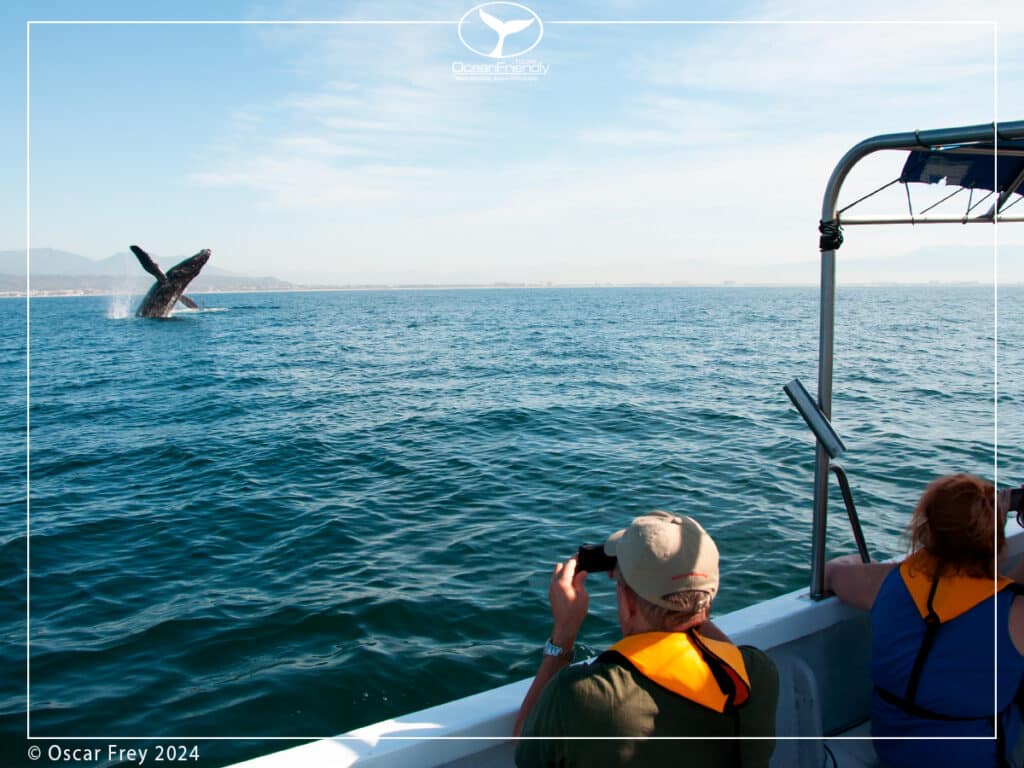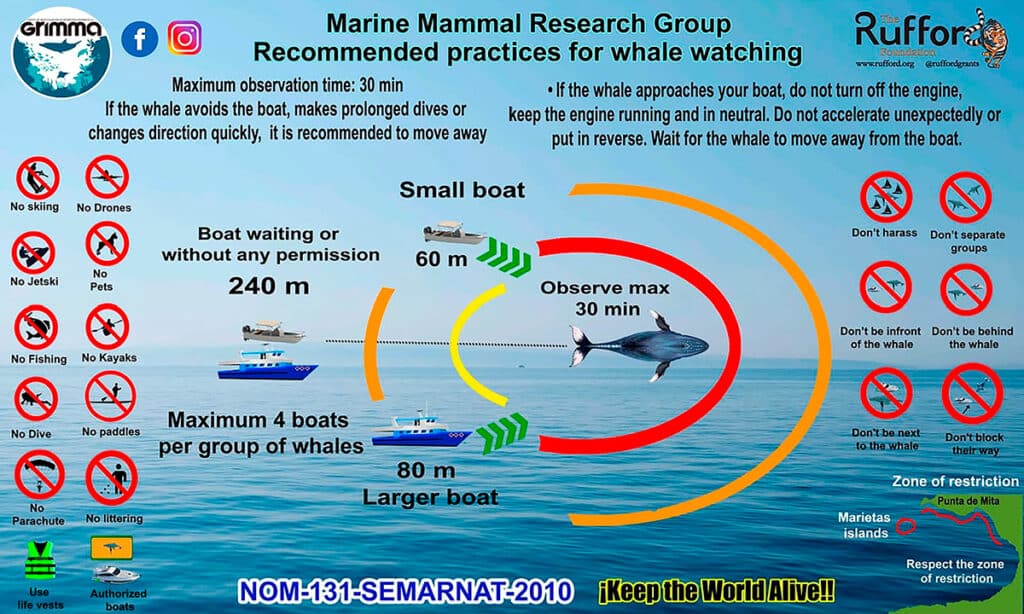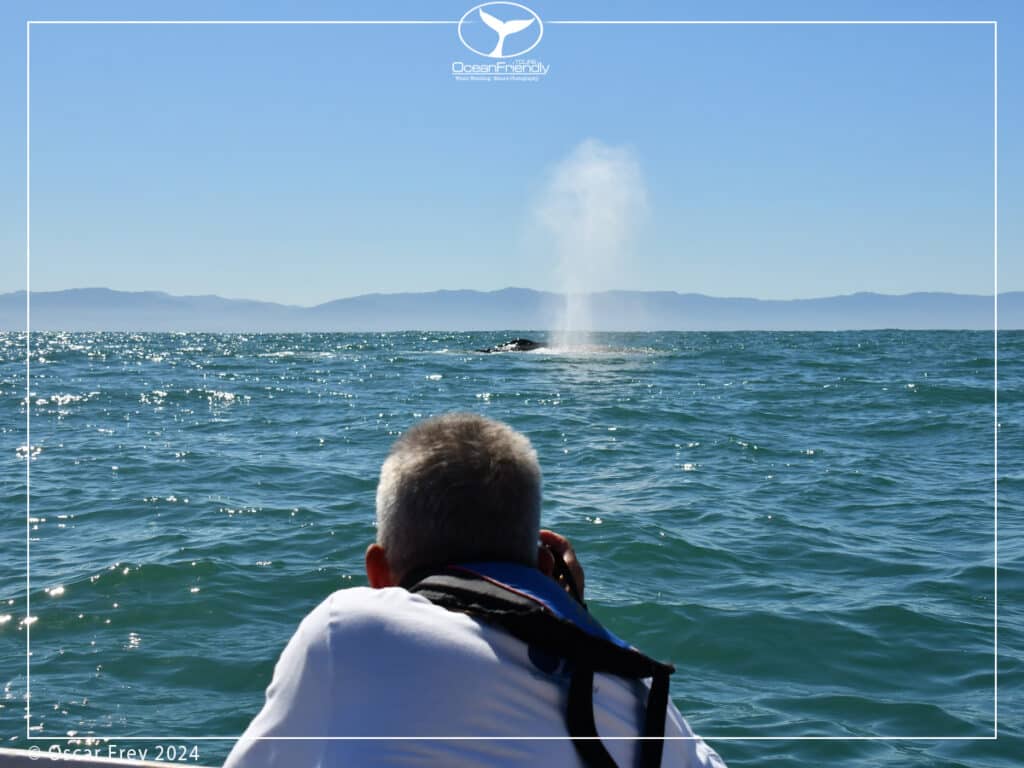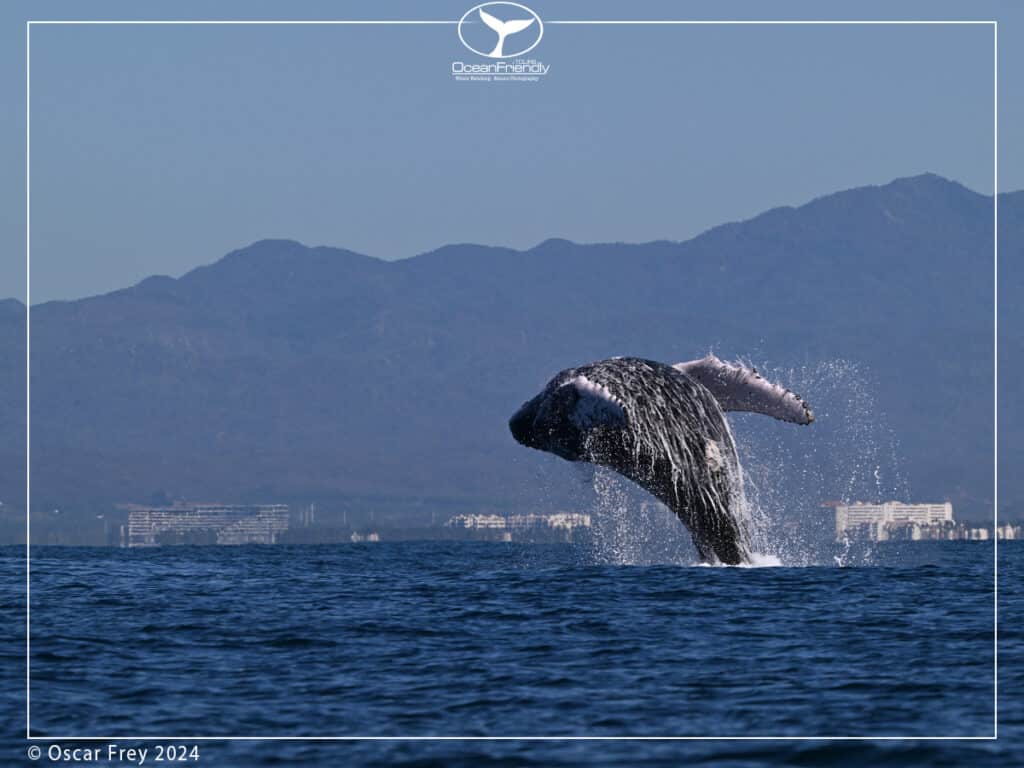Is whale watching ethical or is it just another form of wildlife exploitation disguised as ecotourism? As more travelers seek meaningful, nature-based experiences, this question has taken center stage. Whale watching activities offer the opportunity to witness some of the ocean’s most powerful and inspiring creatures. However, it also raises important concerns about animal welfare, marine conservation and responsible tourism.
The truth is, that not all whale watching is created equal. While poorly managed tours can disrupt marine life, responsible whale watching, when done ethically, can actually benefit whales, support coastal communities, and deepen public commitment to ocean conservation.
In this post, we’ll explore the history of whale watching, what makes it ethical or not, and how to choose an operator that aligns with your values.
The History of Whale Watching
Whale watching began in the 1950s as a peaceful alternative to whaling. The first commercial tour launched in Southern California, offering passengers the opportunity to see these animals alive instead of hunted. As public sentiment shifted away from whaling, whale watching became a symbol of conservation and nature-driven curiosity.
By the 1980s and 1990s, whale-watching operations had spread worldwide. It was viewed as a win-win: a sustainable, non-lethal way to interact with marine life that supported local economies. But as the industry grew, so did concerns about how human presence might impact whale behavior, migration patterns, and stress levels.
This shift in awareness gave rise to the concept of ethical and responsible whale watching, an approach that prioritizes the well-being of whales, respects local communities, and promotes education over entertainment.
Whale Watching vs Whaling: A Shift in Human Values
It’s worth remembering that just a few decades ago, whales were hunted for oil, meat, and profit. Today, many of those same species are being protected and revered by people who once hunted them.
This shift, from harpoons to binoculars and cameras, signals a profound change in how we value wildlife. Instead of extracting it from the ocean, we are learning to observe it and appreciate it. Instead of dominance, we are choosing connection and understanding.
In many ways, the rise of responsible whale watching is a sign of evolving human values. It shows that we are capable of change, and that compassion, education, and economic sustainability can go hand in hand.
But this transformation isn’t guaranteed. It depends on continued awareness, thoughtful choices, and strong protections to ensure we never repeat history.
What Is Ethical Whale Watching?
Ethical whale watching means putting the whales first. It involves thoughtful practices that minimize disturbance, respect natural behaviors, and operate within guidelines carefully designed by marine scientists and conservation organizations.
Key principles of ethical whale watching include:
- Keeping a safe and respectful distance from whales.
- Limiting the number of boats near the whales at any given time.
- Limiting the time a boat stays around the same whale or group of whales. In Mexico the time limit is 30 minutes.
- Reducing noise pollution from engines. The use of 4 Stroke and electric engines minimizes noise pollution.
- Avoiding high-speed navigation or sudden changes in direction in the vicinity of whales.
- Limiting the speed of boats and traffic in areas where whales gather.
- Educating passengers about marine conservation.
This kind of approach transforms the tour into more than a sightseeing trip. It becomes a learning experience that fosters empathy, respect, and a long-term commitment to protecting marine ecosystems.
Community-Led Conservation and Indigenous Knowledge
In many parts of the world, ethical whale watching is being led by local and indigenous communities who have deep, ancestral ties to the sea.
These communities often bring a different perspective, one rooted in respect, reciprocity, and harmony with nature.
For example:
- In New Zealand, the Māori people have been key to shaping conservation laws and running whale tours that honor their spiritual connection to marine life.
- In Mexico, the Seri people of Sonora engage in seasonal whale watching that aligns with their cultural traditions and ecological knowledge.
- In British Columbia, First Nations communities have established codes of conduct that blend science with ancient respect for Orcas.
Supporting these tours not only promotes responsible whale watching, it also uplifts cultural preservation and economic independence for communities who have stewarded the ocean for generations.
Who Practices Responsible Whale Watching?
Responsible whale watching is practiced by operators who prioritize the health of whales over profits. These companies often work in partnership with conservation groups, adhere to international whale-watching guidelines, and invest in ongoing staff training.
When Whale Watching is done responsibly, every sighting and encounter happens under the whales´ terms.
At Ocean Friendly Tours, for example, our philosophy is simple: if the whales are not safe or comfortable, we don’t approach. We respect the proximity whales feel comfortable around our boats and we prioritize environmental education over entertainment. Our captains are trained naturalists, and we limit our trips to small groups to reduce our footprint on the water. Each tour is both a scientific and spiritual journey, rooted in respect and awe for marine life. We use technology and education as tools for conservation which provides safety for the whales, safety for the guests and a unique experience.
Other responsible whale-watching operators around the world share similar values. They focus on education, sustainability, and transparency. They also often contribute to citizen science projects by collecting data on whale sightings, behaviors and biodiversity.
Where Is Ethical Whale Watching Taking Place?
Ethical whale watching is gaining traction globally, especially in areas with strong conservation frameworks. Some of the most recognized destinations for responsible whale watching include:
- Mexico (Baja California, Puerto Vallarta, and the Sea of Cortez)
- Iceland (Húsavík)
- Australia (Hervey Bay and Western Australia)
- New Zealand (Kaikōura)
- Canada (British Columbia and Newfoundland)
- South Africa (Hermanus)
- Norway (Tromsø)
These locations often have government regulations in place and a culture of environmental awareness, which helps ensure that whale watching is conducted in an ethical and sustainable way.
The whale watching regulations in Mexico are published as the NOM-131-SEMARNAT-2010. You can find them translated to English here.
You can learn more about the best places for whale watching on our recent blog post.
When Is Whale Watching Ethical vs Unethical?
Whale watching is ethical when it prioritizes the well-being of the whales and follows science-backed guidelines. It becomes unethical when prioritizes entertainment over conservation or education, in consequence you find boats chasing whales, disrupting natural behaviors, or crowding them in their habitat.
Signs of unethical whale watching:
- Vessels that perform wake up speeds toward and closely following whales.
- Operators that allow loud music and / or shouting and loudness on board.
- Boats that spend prolonged time with the same whale or group of whales.
- Operators that do not put safety for the guests and safety for the whales as a priority. For example, tours that serve alcoholic beverages while around whales and / or that do not provide a life vest to their guests at all times.
- Operators that do not control the engine emissions of their vessels with proper maintenance.
- Tours that promise “guaranteed” close encounters or “guaranteed” sightings.
- Companies that ignore whales´ seasonality cycles.
- Lack of transparency about conservation practices.
In contrast, responsible whale watching operators will modify tours based on whale behavior, cancel tours based on sea conditions, and considering the welfare of the whales and the safety of their guests first. Ethical tourism is fluid and responsive, not rigid or profit-driven.
How Is Whale Watching Ethical?
Whale watching becomes ethical when it acts as a tool for environmental preservation rather than exploitation.
It is ethical when:
- The primary goal is education, not entertainment.
- Whale welfare takes precedence over tourist amusement satisfaction.
- Operators follow all legal and scientific guidelines.
- Tours are low-impact and environmentally oriented.
- The activity contributes to local conservation efforts.
Ethical whale watching is about coexisting with nature, not overcoming it. The experience is shaped by humility, admiration and a deep sense of responsibility. A high value of respect, humility and understanding supports the ethical argument with real-world systems and oversight.
The Role of Policy and Global Guidelines
Responsible whale watching doesn’t happen by accident. It’s often the result of years of advocacy, research, and policy development by global conservation groups.
Some key regulatory frameworks include:
- International Whaling Commission (IWC) Guidelines – Voluntary best practices for of maneuvering around whales, approach distance, vessel speed, and passenger conduct.
- World Cetacean Alliance establishes International Guidelines that guarantee the conservation and protection of cetaceans.
- ACCOBAMS – A binding agreement among countries bordering the Mediterranean and Black Seas to protect cetaceans through monitoring and training.
- National marine tourism laws – Countries like Australia, the U.S., and Mexico have legal limits on how close boats can get and how many can operate in a given area.
Local enforcement also plays a key role. In some destinations, operators need permits, follow seasonal restrictions, and are monitored by environmental authorities.
When you book a tour with a company that follows these guidelines, you are actually supporting a larger global effort to protect whales and the ecosystems where they inhabit. Protecting whales promotes a healthier ocean and a healthier planet; this is the main reason why we must protect whales.
Why Is Whale Watching Ethical and Educational?
Whale watching is ethical and educational when it has the potential to change hearts and minds. Seeing a whale breaching, hearing its tonal songs over the surface and witnessing them caring for their young is awe-inspiring. When educational value is added to the experience, conservation awareness is planted. In other words, these highly emotional experiences have the ability to ignite conservation awareness in us.
The educational value is a core aspect of responsible whale watching. Ethical operators use their platform to share relevant information about:
- Whale biology and behavior.
- The threats that whales face (noise pollution, climate change, ship strikes, plastic and other chemical pollution).
- How individuals can support marine conservation.
- Local ecosystem dynamics and biodiversity.
Rather than just a boat ride, an ethical whale watching tour becomes an environmentally oriented classroom dedicated to plant the awareness of conservation.
How Whale Watching Benefits Whales, Communities, and the Ecosystem
Ethical whale watching creates ripple effects that extend far beyond the ocean. It can:
Transform Coastal Communities
Tourism revenue from whale watching can provide steady income for coastal areas and communities that previously relied on extractive industries. Instead of hunting whales or overfishing, communities gain a livelihood from protecting the environment where they live.
Generate Sustainable Income
Whale watching, when properly managed, offers long-term economic benefits without depleting resources. Operators that practice sustainability often build repeat business, draw ecotourism traffic, and support complementary services like eco-lodges, local guides, and artisanal vendors.
Raise Awareness about Conservation
Many people return from a whale watching tour with a new appreciation for the ocean. These emotional connections can inspire long-term environmental behavior change, like reducing plastic use, supporting marine policies, or donating to conservation efforts.
Support Research
Some tour companies also collaborate with marine scientists or institutions by sharing data, photos, and other relevant information. This research network helps inform policies and better understand whale migration, health, and population trends.
How to Choose a Sustainable Whale Watching Operator
Choosing a responsible whale watching operator is the most important thing you can do as a whale watcher. Look for the following signs:
They Follow All the Rules
Ethical tour operators adhere to local and international guidelines for whale watching. They maintain allowed approach distances, limit trip frequency, and prioritize the whale’s comfort.
They Take Pride in Low-Impact Adaptations
From quiet engines to non-plastic waste production on board, look for signs that the company takes sustainability seriously. Some operators even offset their carbon footprint or donate a portion of the proceeds to marine nonprofits.
They Avoid High-Risk Encounters
They never promise that you’ll get close to a whale. In fact, they understand that whale encounters happen on the whales´ terms. Your experience should never come at the expense of wildlife.
They Partner with Animal Welfare Organizations
Look for affiliations with conservation groups, marine biologists, oceanographers or local research teams. This shows that the operator is part of a broader effort to protect and understand the marine environment.
When and Where to See Different Whales
Whale migrations follow seasonal patterns, and different species appear at different times of year depending on the region. Here’s a quick guide:
- Humpback Whales: Best seen in Mexico, Hawaii, and Australia between December and late March.
- Gray Whales: Migrate to Baja California from December to April and back to California all the way to Alaska from May to November.
- Blue Whales: Appear in the Sea of Cortez during winter and spring and in Sri Lanka during summer.
- Orcas: Resident pods are seen year-round in British Columbia and Norway.
- Southern Right Whales: Best seen in South Africa and Argentina from June to October.
Planning your trip around the right season not only increases your chances of sightings but helps reduce pressure on the whales. Especially during sensitive times of their life cycle, like during migration between their feeding and breeding grounds and vice-versa.
Curious about where to go? Check out our guide to the Best Places to Whale Watch in the World for top locations, insider tips, and travel inspiration.
Conclusion
So, is whale watching ethical? It can be if it’s done responsibly. Ethical whale watching puts animals first, respects their habitat, supports conservation and brings lasting benefits to coastal communities and ecosystems.
By choosing responsible whale watching operators and educating yourself before you book, you become part of the solution. You’re not just watching whales, you’re helping protect them for the long-lasting well-being of planet Earth and for future generations.
Let your next adventure be one that leaves a positive footprint on the ocean.
FAQ
Are whale watching tours bad for whales?
Whale-watching tours are not bad for whales if they are done responsibly. Unethical tours can stress whales and disrupt their behavior. However, responsible operators follow strict guidelines to minimize disturbance and prioritize whale welfare.
Are whale watching tours ethical?
Yes, when they’re run by companies that follow conservation protocols, educate passengers, and respect marine wildlife. Look for operators that practice responsible whale watching.
Is whale watching worth it?
Yes whale watching is worth it. For many people, seeing a whale in the wild is a once-in-a-lifetime experience. When done ethically, it’s not only worth it but deeply meaningful and educational.
Are whale watching tours worth it?
Yes whale watching tours are worth it, especially when the tour emphasizes education, conservation, and responsible interaction. You’ll leave with memories, insights, and a stronger connection to nature.








